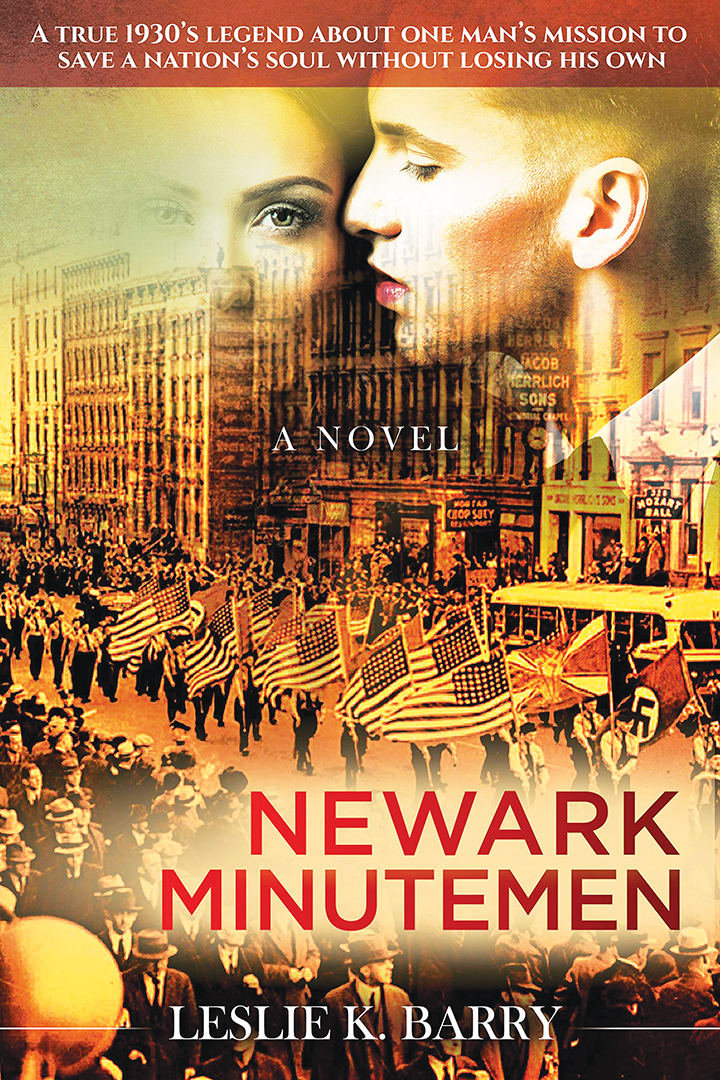A tale of Jewish mobsters fighting Nazis…in New Jersey

By Dan Pine, j. The Jewish News of Northern California
Once upon a time in America, it was OK to punch Nazis.
In the years before World War II, many German Americans had sworn allegiance to Hitler. Goose-stepping down Main Street, waving swastika banners, sending their kids to Nazi summer camps in upstate New York, the German American Bund was an insidious domestic force in the 1930s.
As novelist Leslie K. Barry learned, not everyone took it lying down.
In New Jersey, for example, the FBI, the Jewish mob, and some tough-as-nails Jewish boxers formed the Newark Minutemen. Their mission: Deliver knockout blows to the neighborhood Nazis, with a larger goal of disrupting their effectiveness at gaining sympathizers.
Barry grew up hearing stories about her late Uncle Harry and his amateur boxing days during the Depression. Only years later did she learn from her mother that Harry Levine was also a member of the Newark Minutemen. That family lore is how her debut novel, Newark Minutemen, was born.
“My mom came from a big immigrant Jewish family,” Barry said, “and she told a zillion stories. We were totally aware that (Harry) was a Golden Gloves boxer. But at (mom’s) 90th birthday party, people remembered when Harry used to go out and beat up the Nazis.”
She discovered there had existed a vast network of coast-to-coast Nazi sympathizers and many members of the Bund.
Their leader, German-born U.S. citizen Fritz Kuhn, plotted to turn the United States into a satellite of Hitler’s Nazi empire.
A 1939 rally held in Madison Square Garden drew some 22,000 American Nazis and sympathizers. A 2017 documentary film by Marshall Curry stressed that this rally happened not in Berlin, but in New York City.
Barry also learned that Newark mobster Abner “Longie” Zwillman teamed up with the FBI to harass the Nazis by any means necessary. For that, Zwillman recruited local Jewish boxers such as Nat Arno and Barry’s uncle to throw a monkey wrench into Nazi activities. If wrenches weren’t available, maybe they used iron bars.
Barry could have written an authoritative history of the period. Instead, she chose to fictionialize it, creating a main character, Yael, a streetwise boxer whose father had been murdered by Nazi toughs, and his improbable love interest, Krista, the German American daughter of a local Nazi leader who comes to question her father’s fascist ideology.

“I chose fiction because my vision was Titanic,” she said, referring to the classic hit 1997 film. “I always wanted to make it as true as possible, but I thought it would be more blockbuster if you layered in the love story.”
Blockbuster is the right term, as Barry has sold the film rights to her book, and the project is in development.
She said Newark became the locus of Minutemen activity because it was a bubbling American melting pot, with many Jews and German Americans living in close proximity.
Philip Roth’s speculative novel The Plot Against America also was set in mid-20th-century Newark, and it too explored issues relating to Jews and the growth of pro-Nazi sentiment in the United States.
Barry said government officials approached Jewish mob boss Meyer Lansky during that time.
“They said to him, ‘The U.S. government can’t do anything about this Nazi Party rising in America. We need your help.’ Lansky said, ‘You don’t need to pay us; you just need to look the other way.’”
Lansky then asked Zwillman to organize what became the Newark Minutemen.
Though Barry’s story is set in the 1930s, she hopes her book’s message rings a few contemporary bells. In a time when torch-bearing neo-Nazis and armed right-wing hooligans have cruised U.S. cities spoiling for a fight, the novel’s present-day resonance in terms of social unrest and politics is hard to miss.
“I am very sensitive to what’s going on now, when people lose confidence and question the people in charge and look for answers elsewhere,” she said. “(In the 1930s) we were poor, there was no food on the table, nothing was working. We were looking for answers. That’s the parallel for today, we don’t know what to believe. This problem with divisiveness and not knowing what to believe is frightening.”
She said Jewish values are her rock. “It’s an easy and important (foundation) to project onto the way we live. It goes deep in me and was a message I wanted to get across (in the novel): You don’t just stand by and do nothing.”
The JCC Cultural Arts & Book Series presents Leslie K. Barry via Zoom, 7 p.m., Tuesday, April 13. Free. To register, click here.
To read the complete April 2021 Dayton Jewish Observer, click here.

